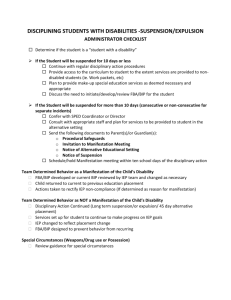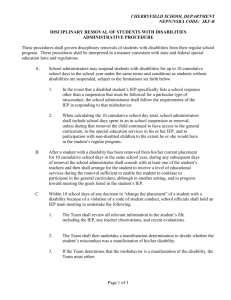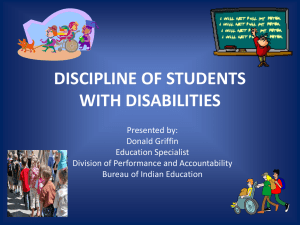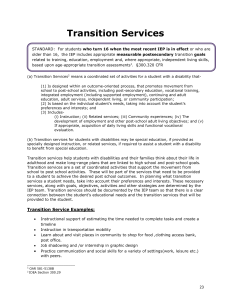Discipline of Students with Disabilities
advertisement
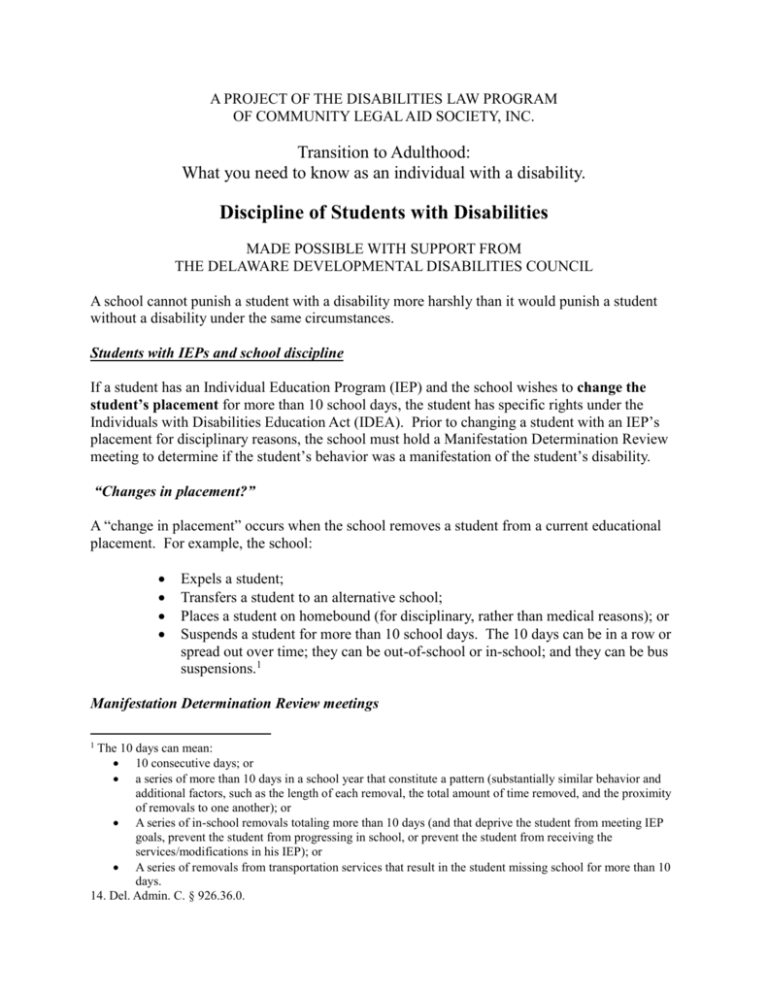
A PROJECT OF THE DISABILITIES LAW PROGRAM OF COMMUNITY LEGAL AID SOCIETY, INC. Transition to Adulthood: What you need to know as an individual with a disability. Discipline of Students with Disabilities MADE POSSIBLE WITH SUPPORT FROM THE DELAWARE DEVELOPMENTAL DISABILITIES COUNCIL A school cannot punish a student with a disability more harshly than it would punish a student without a disability under the same circumstances. Students with IEPs and school discipline If a student has an Individual Education Program (IEP) and the school wishes to change the student’s placement for more than 10 school days, the student has specific rights under the Individuals with Disabilities Education Act (IDEA). Prior to changing a student with an IEP’s placement for disciplinary reasons, the school must hold a Manifestation Determination Review meeting to determine if the student’s behavior was a manifestation of the student’s disability. “Changes in placement?” A “change in placement” occurs when the school removes a student from a current educational placement. For example, the school: Expels a student; Transfers a student to an alternative school; Places a student on homebound (for disciplinary, rather than medical reasons); or Suspends a student for more than 10 school days. The 10 days can be in a row or spread out over time; they can be out-of-school or in-school; and they can be bus suspensions.1 Manifestation Determination Review meetings The 10 days can mean: 10 consecutive days; or a series of more than 10 days in a school year that constitute a pattern (substantially similar behavior and additional factors, such as the length of each removal, the total amount of time removed, and the proximity of removals to one another); or A series of in-school removals totaling more than 10 days (and that deprive the student from meeting IEP goals, prevent the student from progressing in school, or prevent the student from receiving the services/modifications in his IEP); or A series of removals from transportation services that result in the student missing school for more than 10 days. 14. Del. Admin. C. § 926.36.0. 1 A Manifestation Determination Review (“MDR”) meeting is a special meeting where members of the student’s IEP team must determine, based upon the student’s history, IEP, teacher observations, and other relevant information whether the misbehavior was a “manifestation” of the student’s disability. Specifically, the IEP team is required to review whether: The student’s misbehavior was caused by, or directly and substantially related to, the student’s disability; or The student’s misbehavior was a direct result of the school’s failure to follow the student’s IEP. If the answer to either of these two questions is YES then the behavior is considered a manifestation of the student’s disability. It is important to note that the team must consider any of the student’s disabilities, regardless of the student’s classification. Take for example a student who has a visual impairment and who also has a diagnosis of ADHD. Even though the student’s IEP classification is Visual Impairment and the student’s IEP only addresses that visual impairment, the team must still consider whether the student’s misbehavior was a result of the student’s ADHD (although the school can ask for documentation of that diagnosis). When an MDR meeting must occur The MDR meeting must occur within 10 school days of the school’s proposal to change your placement. While you wait for this meeting, the school may not transfer you to another school or force you to stay at home for more than 10 days, unless your behavior involved drugs, a deadly weapon, or serious injury to another person (please see below for more information). Preparing for an MDR You should always take an MDR very seriously. Sometimes school staff is not clear about how serious these meetings can be. Always remember a possible outcome from an MDR is the school could change your placement, including by expelling you or putting you in an alternative school. Therefore, you want to be prepared to make a strong case for yourself. This may involve getting someone who is an expert in your disability, such as your doctor or therapist, to participate in the MDR, or to provide a written opinion that the behavior was a manifestation of your disability. When it comes to MDRs, there is strength in numbers, so you can bring a number of people with you to the meeting (just make sure you know in advance whether those people agree with you that the behavior was a manifestation of your disabilities – you may not want to bring anyone with you who does not think it was a manifestation). You should also be aware that if the behavior at issue could potentially bring criminal (or juvenile delinquency) charges, that anything you say to school staff could potentially be used against you in a subsequent prosecution. Thus, you may need to exercise your 5th Amendment right against self-incrimination. This means that you do not have to say anything that might get you into criminal trouble. In these cases, it may be best for the student not to speak or participate in the MDR, but rather have the parents/guardians or others advocate for you. For example, such persons can discuss how the alleged behavior would be a manifestation of your disability. Next steps If the school determines the misbehavior was a manifestation of your disability: If the individuals at the MDR agree that the student’s misbehavior was a manifestation of a disability—the student CANNOT be suspended, expelled, or transferred to a new school as punishment (note: there are exceptions regarding misbehaviors involving drugs, a deadly weapon, or serious injury to another person). Next, the school must conduct a Functional Behavioral Assessment (FBA) (unless already conducted). The FBA identifies trigger behaviors and helps the IEP team select interventions to directly address the problem behavior. In addition to an FBA, the school must develop a Behavior Intervention Plan (BIP) or review and revise the prior plan to appropriately handle misbehaviors. If the school determines the misbehavior was NOT a manifestation of your disability: If your behavior is found NOT to be a manifestation of your disability, the school may discipline you under the same procedures, in the same manner, and for the same amount of time as they would for students without disabilities. However, even if you are removed from your educational placement, you still are entitled to receive a Free Appropriate Public Education, although in a different setting. The school should also consider doing an FBA and developing a behavior intervention plan. If you disagree with the determination that the behavior was NOT a manifestation, you may request a special education hearing (also called a due process hearing) to challenge this finding. In the meantime, the school may discipline you. A due process hearing must be concluded within 20 school days, and the Hearing Officer must make a decision within 10 more school days. If the Hearing Officer rules that you conduct was a manifestation of your disability, the school must return you to the placement you were in before the misbehavior. Students are still entitled to receive special education services if they have been suspended, expelled, or transferred to another school! A student’s IEP must remain in place along with all necessary aids and services. In addition, if a student’s removal from school results in a change in placement, a student’s IEP team must meet to determine appropriate services to progress towards the IEP goals in a different setting. When the misbehavior involved drugs, a deadly weapon, or serious injury to another person A student’s misbehavior is called a “special circumstance” if it involves drugs, weapons, or serious bodily harm to another person, while at school, on school premises, or at a school function under the jurisdiction of the Department of Education or school district/charter school2. If the student’s misbehavior is one of these “special circumstances,” the school can 2 14 Del. Admin. C. § 926.30.7 immediately remove the student to an alternative placement for up to 45 school days even if the student has a disability, and even if the school and parent agree that the misbehavior was a “manifestation” of the student’s disability. Students not yet eligible for special education services The IDEA provides that a student who has not yet been identified as eligible for special education can “access any of the protections” available to special education students if: The parent has previously expressed concern in writing to school officials that the student needs special education; The parent has requested a special education evaluation; or The teacher or other school staff has expressed concern about the behavior of the student to special education officials. Thus students that fall into one of the above categories have the right to the same protections, including the Manifestation Determination Review procedures, as students who actually have an IEP. In fact, if a student has a history of discipline problems, and is likely to have further misbehavior, it can be helpful to get an evaluation request in (in writing!) as soon as possible. That way, if there is further behavior that is subject to discipline, the student will have the protections of the IDEA. Students with 504 Plans and school discipline If you are disciplined and have a Section 504 Plan in place, the school must hold a Manifestation Determination Review meeting, which is described above. However, if your misbehavior involved drugs, your Section 504 Plan will not protect you against school disciplinary actions.
